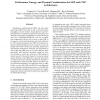Free Online Productivity Tools
i2Speak
i2Symbol
i2OCR
iTex2Img
iWeb2Print
iWeb2Shot
i2Type
iPdf2Split
iPdf2Merge
i2Bopomofo
i2Arabic
i2Style
i2Image
i2PDF
iLatex2Rtf
Sci2ools
102
Voted
HPCA
2005
IEEE
2005
IEEE
Performance, Energy, and Thermal Considerations for SMT and CMP Architectures
Simultaneous multithreading (SMT) and chip multiprocessing (CMP) both allow a chip to achieve greater throughput, but their relative energy-efficiency and thermal properties are still poorly understood. This paper uses Turandot, PowerTimer, and HotSpot to explore this design space for a POWER4/POWER5-like core. For an equalarea comparison with this style of core, we find CMP to be superior in terms of performance and energy-efficiency for CPU-bound benchmarks, but SMT to be superior for memory-bound benchmarks due to a larger L2 cache. Although both exhibit similar peak operating temperatures and thermal management overheads, the mechanism by which SMT and CMP heat up are quite different. More specifically, SMT heating is primarily caused by localized heating in certain key structures, CMP heating is mainly caused by the global impact of increased energy output. Because of this difference in heat up machanism, we found that the best thermal management technique is also different for S...
Related Content
| Added | 01 Dec 2009 |
| Updated | 01 Dec 2009 |
| Type | Conference |
| Year | 2005 |
| Where | HPCA |
| Authors | Yingmin Li, David Brooks, Zhigang Hu, Kevin Skadron |
Comments (0)

